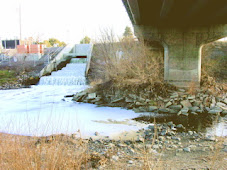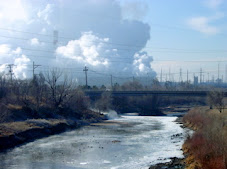 Talking about Denver's media and what they no longer seem to do, has anyone noticed that these days, whenever there is a major environmental incident, like dead ducks, dead fish, the only people contacted and quoted about it are the "officials"? No longer are any environmental groups contacted for a different perspective. What's also fishy is that groups like "Ducks Unlimited" here have had nothing to say about dead ducks at Metro Wastewater, dead ducks at City Park lakes. Not a peep. Not a quack. Should they change their name to "Ducks Limited"?
Talking about Denver's media and what they no longer seem to do, has anyone noticed that these days, whenever there is a major environmental incident, like dead ducks, dead fish, the only people contacted and quoted about it are the "officials"? No longer are any environmental groups contacted for a different perspective. What's also fishy is that groups like "Ducks Unlimited" here have had nothing to say about dead ducks at Metro Wastewater, dead ducks at City Park lakes. Not a peep. Not a quack. Should they change their name to "Ducks Limited"?
I guess they like their funding from Coors, whose toxic wastes from past decades, by the way, are in the highly toxic and radioactive mix from a Superfund site southeast of metro Denver, the infamous Lowry Landfill, where new subdivisions spring up nearby without disclosure to unsuspecting homebuyers of all that lurks beneath and beyond the site boundaries.
What's happening to the toxic, readioactive brew now? It's being flushed back into the public domain and into Metro Wastewater's sewage ponds in Denver and then on for "recycling" at a recently built Denver Water plant. There, the Superfund site-laced sewage effluent, and after only partial treatment that cannot remove or neutralize many of the toxic and nuclear contaminants, is piped via huge purple conduits laid under selected streets in central Denver at public expense, and on to fill the lakes at City Park and Washington Park and irrigate selected parkways, school grounds, golfcourses and other public lands.
Local reporters - some who even work for newspapers whose owners were in on the dirty deal - at the Denver Post and Rocky Mountain News - don't bother to report that some of the same agencies who claim the dead ducks and dead fish are all part of nature's way say some different things in communications amongst themselves. In public reports reviewed under the Colorado Open Record Act recently, it was learned that since 2004, when our trusted officials changed the source of water in City Park and Washington Park lakes to partially treated sewage water, the lakes have not met water quality standards. Violations included exceedances in allowable nitrate levels, standards for metals dissolved in the water, and such.
Of course, the officials, when dead ducks float to shore, will tell you it's all perfectly safe.
And our media, some of whom are actually in on the deal, records show, will keep quiet about it. You can ask former Denver City attorney Dan Muse about it, who as Wellington Webb's appointee maneuvered these deals in secret - including those with the Dean Singleton-owned Denver Post and Scripps-owned Rocky Mountain News - and even the Denver City Council isn't allowed to speak of it. Then after unexpectedly resigning as City Attorney and disappearing from the Denver scene for a time, Muse came back and was re-ensconced as a Webb-appointed Denver Water Board commissioner, who then approved the massive "recycled water" project without even so much as an environmental impact assessment, and against protests from environmental and labor groups who were not so a-Mused. His snide response? "So sue us!" When faced with notice of a plan to challenge his ethics before those who oversee such things for lawyers, he promptly resigned. Surely, just a coincidence.
Now what has Mayor Hickenlooper had to say about all of this? He's ducking the issue while Ms. Dumm, a city PR spokesperson, takes all the quack flack.
Something's fishy about all of that, don't you think? According to an old Chinese proverb, "The fish rots from the head."
Indeed.
P.S. Oh, and one more thing, when hiking around metro Denver's wetlands areas, be on the lookout for plastic alligators.
P.P. S. And for anyone who might think birds are just expendable creatures with no personality, you might want to check this out.




